Over the weekend, Ukraine has succeeded in stalling Russia’s onslaught, publics across the world have rallied behind Ukraine, and trans-Atlantic allies have taken their response to Russian aggression to a whole new level. These developments have forced Turkish President Recep Tayyip Erdoğan — who, ahead of Friday’s NATO meeting to discuss the Russian invasion, had criticized his allies as being all talk and no action — to end his own inaction on Ukraine’s Thursday request for Ankara to close the Bosphorus and Dardanelles, and with them access to the Black Sea, to Russian warships per the 1936 Montreux Convention. The Turkish minister of foreign affairs, Mevlüt Çavuşoğlu, on Sunday announced that what was unfolding in Ukraine was indeed a “war,” effectively closing the straits to the warships of belligerents. Erdoğan on Monday gave his implicit blessing to the decision by declaring how Turkey intends to continue to implement the convention in a manner to prevent crisis escalation, underlining that Turkey desires peace in the region. He expressed disappointment that Turkey’s offers of mediation/arbitration did not bear fruit and that Turkey does not wish to give up good relations with both countries.
The decision was partly prompted by Ukrainian President Volodymyr Zelenskyy’s tweet on Saturday thanking Turkey for closing the straits and partly by the necessity of not being left behind. Zelenskyy deliberately put Erdoğan in the spotlight to break the Turkish president’s indecision. Nevertheless, Erdoğan’s dilemma of choosing between Ukraine and Russia in the conflict has not been resolved. Furthermore, he faces a greater and more fundamental dilemma of whether he will persist with his anti-Westernism, including cozying up to Russia, or take a bold strategic step and return Turkey to its traditional Western vocation.
What Zelenskyy sought from Erdoğan
The Montreux Convention has regulated merchant and military maritime traffic into and out of the Black Sea for 85 years. It lays down a set of provisions to regulate the passage of warships through the straits. These provisions govern the mode of entry, duration of stay, and tonnage, as well as the nature of weapons (main gun calibers, to be precise) they can carry on board. Their application varies depending on whether a passage occurs in peace or wartime or when there is a threat of war. Although the agreement generally favors Black Sea littoral states (Russia, Ukraine, Romania, Bulgaria, and Georgia) over others in terms of transit of warships through the straits, certain restrictions apply universally without regard to a littoral-non-littoral distinction.
Zelenskyy’s call concerned Article 19 of the convention which requires Turkey in time of war to close the straits to the passage of warships from the belligerent states. Turkey has also the option to invoke Article 21 if Turkey considers itself to be threatened with “imminent danger of war.” Then “the passage of warships shall be left entirely to the discretion of the Turkish Government.” However, in both cases there are exceptions which would allow warships belonging to “belligerent Powers” to return to their home bases from outside the Black Sea.
Turkey could have possibly argued that what is unfolding in Ukraine is not a war especially given that Moscow has not officially declared war on Ukraine. However, given the blatant nature of Russia’s aggression, so transparently revealed through social media, such a position would have been embarrassingly lacking in credibility. It would have also opened a Pandora’s box concerning the future of the Montreux Convention. The convention’s implementation was never perfect, but the fact that, so far, there has been no attempt to revise it and the international community has continued to abide by its terms speak volumes. The credit for this primarily went to Turkey’s long-standing tradition of scrupulously overseeing the implementation of its terms. This could have changed, and triggered demands for revisions, a longtime nightmare of Turkey. Moreover, the decision to close the straits to the warships of the belligerents is unlikely to alter the military situation in the Black Sea. Russia’s Black Sea Fleet, based in Crimea, is formidable; Moscow had already completed its naval buildup, and Ukraine’s navy is very limited. The real impact of the Turkish decision will be felt if the conflict turns into a war of attrition for Russia.
Erdoğan’s reasons for caution and new dilemmas
The Turkish economy is in its worst state since a long time, marked by galloping inflation and a growing current accounts deficit. Both Russia and Ukraine are economically dear to Turkey. 78% of Turkey’s grain imports come from the two countries (64.6% from Russia and 13.4% from Ukraine). At a time when Western tourists are staying away, Russian and Ukrainian ones have constituted an important source of income for a sector that accounts for around 4% of the Turkish GDP. Both countries are important markets for Turkish exports as well as construction services. Finally, Turkey has important defense projects with both. Indeed, Turkish Bayraktar TB2 drones have been a valuable asset for Ukraine in the early days of the war.
However, in terms of dependence, the balance has favored Russia. Firstly, on energy Turkey depends heavily on Russia. It is the second largest importer of Russian natural gas after Germany and Russia has been constructing a nuclear energy station that would supply 30% of Turkey’s energy needs by 2030. Secondly, Turkey has relied on Russian acquiescence in northern Syria to deter the Assad regimes from mounting an offensive that risks displacing large numbers of displaced Syrians into Turkey at a time when public discontent against Syrian refugees is peaking (see slide 95 here). Furthermore, there is also the legacy of the pain that Russian President Vladimir Putin inflicted on Turkey after a Russian fighter plane was shot down by Turkey in November 2015 and the way Putin extracted an apology from Erdoğan himself.
Undoubtedly, these considerations would have weighed heavily in Erdoğan’s initial inaction and choice to play for time not to upset Putin. It may still be too early to predict the course of events in the immediate future, but it is increasingly looking like Putin’s strategy has failed, and Ukrainians at large have stood their ground long enough for most of the world to rally behind them. More importantly, Putin inadvertently has helped trans-Atlantic allies to unite and finally confront him with truly harsh sanctions as well as supply significant lethal weapons to Ukraine. Furthermore, this past weekend also revealed the weakness of Putin’s governance system in the face of a country led by a democratically-elected president fighting to join the Western world.
Beyond the pressure that the crisis is putting on energy prices, Western sanctions — especially the decision to restrict Russian banks’ access to SWIFT — will adversely impact the Turkish economy. The fragile Turkish currency lost 5% of its value just on the news of the Russian invasion. News of a barrage of tourism cancellations destroying expectations of a post-COVID-19 boom is going to exacerbate this fragility.
These developments leave Erdoğan facing a new dilemma: to persist with his current policies or return Turkey to its traditional Western strategic orientation. The decision to implement Article 19 of the Montreux Convention was a significant step in the right direction but more should follow. Three suggestions: cease the incessant anti-Western rhetoric, abandon justifying the construction of the massive Canal Istanbul project as allowing Turkey to circumvent the Montreux Convention, and scrap the Russian S-400 missile systems that have so badly damaged the standing of Turkey in the trans-Atlantic alliance and increased Turkey’s dependence on Russia.
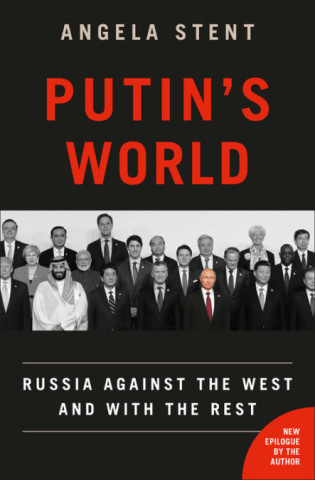
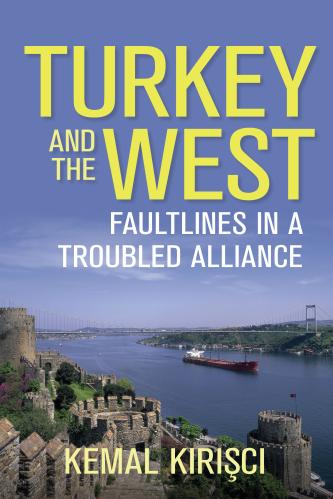
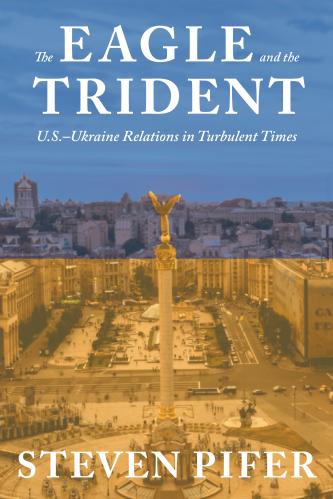
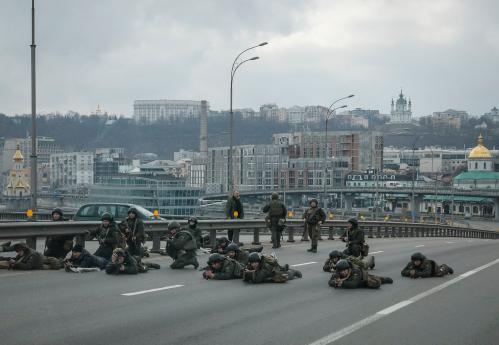
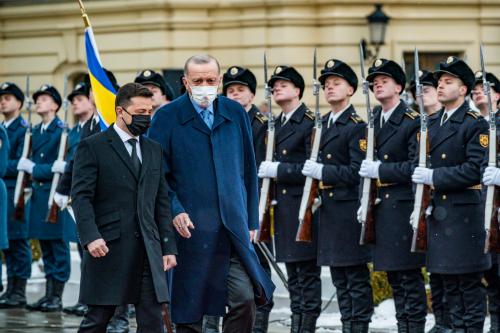


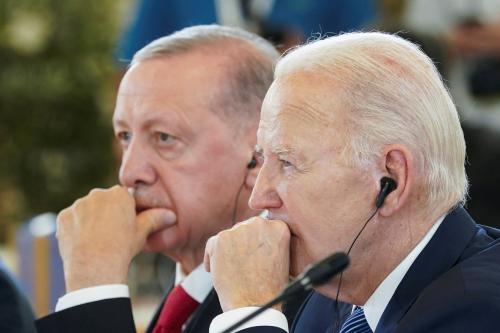
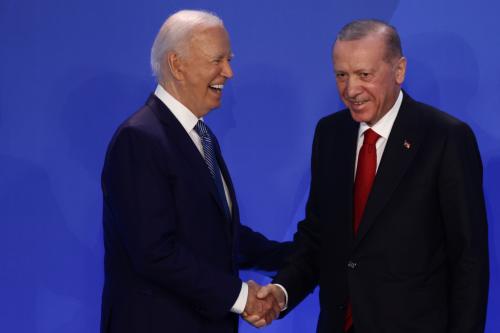
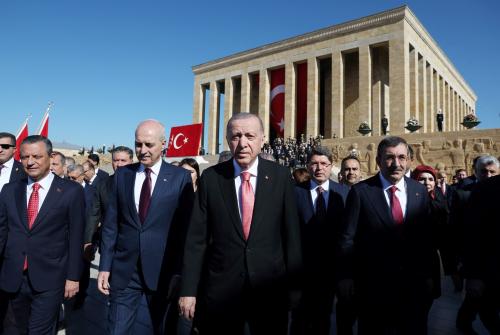
Commentary
Erdoğan’s straits of indecision in the Russia-Ukraine war
February 28, 2022